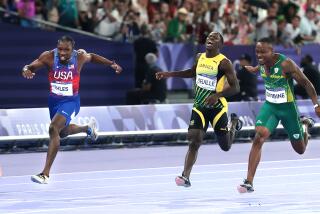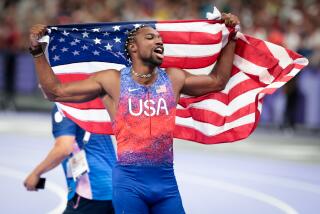Christie Wins in 9.87; Lewis Fourth : World track: Briton, 33, misses equaling 100-meter record by 0.01 while edging Cason and Mitchell, who are also timed under 10-flat.
- Share via
STUTTGART, Germany — The Chinese like to say that a journey of a thousand miles begins with one step. The same, of course, is true of shorter distances, say, 100 meters. In Linford Christie’s case, his first step Sunday night at Gottlieb Daimler Stadium was the most important of his short sprint and perhaps of his long, often unappreciated sprint career.
“I got out before the b in bang ,” he said of his reaction time to the gun.
That was all the advantage the 33-year-old British sprinter needed to beat three of the fastest Americans of all time--Andre Cason, Dennis Mitchell and Carl Lewis--and add the 100-meter title in track and field’s World Championships to the one he won last summer in the Olympics.
It was not quite two years ago, during the World Championships in Tokyo, that Christie spoke of retirement. Frustrated because he ran the 100 in a European-record time of 9.92 seconds and still finished behind three Americans, including Lewis, who had set the world record at 9.86, Christie said there were no faster times in his aging legs.
Not so. Christie did not equal the world record Sunday night, but he came as close as possible, finishing in 9.87, the second-fastest ever. Cason was second in 9.92, Mitchell third in 9.99 and Lewis fourth in 10.02.
But Christie was not running against the clock. He was running against Lewis.
Christie’s victory last summer in Barcelona was not as satisfying as it might have been because he did not run against Lewis, who, suffering from allergies, had failed to earn a berth on the U.S. team in the 100. And although he beat Lewis the only two times they had met since, Christie did not doubt his nemesis, who said he was saving his best for the World Championships.
So, for this victory, Christie offered no apologies.
“Everyone says Carl Lewis is the greatest of all time,” he said. “But I think I should be up there somewhere.”
Hinting that his career is nearing its end, Christie referred to Cason, 24, and Mitchell, 27, as “the beginning of a new era,” implying that the old one is finished. That would be the one that was dominated by Lewis.
But Lewis was not so quick to put a period on his sprint career, even though he recently turned 32, has not won in seven 100-meter races this year and failed Sunday night to win a medal in an event of a major championship meet for the first time.
In three previous World Championships, dating to the initial one in 1983, he won the 100 meters each time. This time, he was seventh entering the final 10 meters. He used his experience to outlean three other sprinters and finish within grasping distance of a medal.
“I didn’t run well,” said Lewis, who still has the 200 meters to run this week. “I haven’t run well all year. It’s just a down year. You have those. I’ll definitely be back.”
Frank Dick, Great Britain’s coach, was not so sure.
“Yeah,” he said when asked if he believes Lewis’ days of sprint dominance are behind him. “But I don’t think we should say that without a mode of admiration and respect. The man is a genius of the event. I think you’ve seen a touch of genius here, a man who spread his motivation over so many events from 1983 to ’93. Linford’s period of motivation didn’t start until ’86.”
But Loren Seagrave, a U.S. sprint coach, said Lewis will decide when he is finished as a sprinter. He already has announced he wants to resume his long jump career next year.
“As long as Carl is having fun and enjoying the sport and has the motivation, he will be a threat to make the U.S. team in the 100 and the 200,” Seagrave said.
Seagrave coaches Cason, the U.S. champion who appeared to be favored entering the final after running the best time in each of the three preceding rounds, including personal bests of 9.96 in the quarterfinals Saturday and 9.94 in the semifinals earlier Sunday.
Considering that Cason never had run in a major final, however, doubters wondered if he could handle the pressure.
“We knew that with the pressure of this event, the guy would buckle,” Dick said. “He buckled, all right, to a 9.92.”
But if Cason’s time was impressive for his first time in a World Championship final, his race was not.
First things first. Although the 5-foot-7, muscular Cason usually springs out of the blocks before his competitors, he had the slowest reaction time to the gun Sunday night. Christie beat him out of the blocks by four-hundredths of a second, eventually beating him to the finish by five-hundreths of a second.
Seagrave said Cason spent so much energy attempting to catch Christie in the first 30 meters that he had nothing left at the finish. The two sprinters were even at 85 meters, but the race was too long for Cason.
He seemed aware of that, glancing to his left to see if it were possible that Christie also was fading.
What he saw was the new world champion.
More to Read
Go beyond the scoreboard
Get the latest on L.A.'s teams in the daily Sports Report newsletter.
You may occasionally receive promotional content from the Los Angeles Times.






